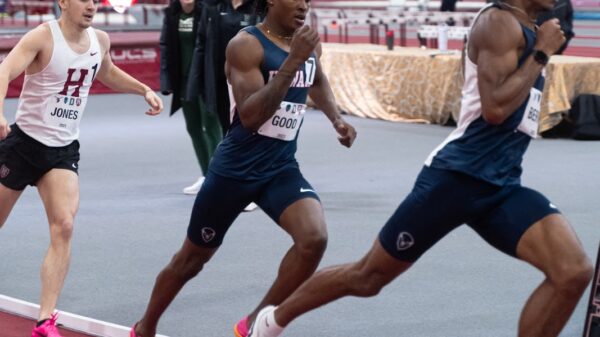
Dr. Greg Carr began his time at Howard University in 2000. After appearing on a panel at the National Council of Black Studies, he was approached by Russell Lee Adams, the then Chair of the Afro-American Studies Department at Howard, who told him, “You need to come to Howard.”
Today, he has taught thousands of Bison as an associate professor, a former chair of the Afro-American/Africana Studies department and a law professor in the Howard School of Law.
This fall marks 23 years Carr has taught at Howard, being regarded as one the most popular and beloved teachers by students as well as his faculty and the greater Howard community. He has twice been named, “HBCU Male Faculty Member of the Year,” by HBCU Digest. One of the things that connects to students is his teaching style which focuses on organic discussion but grounded in the history of African people.
Students are able to take Carr for various different courses including Intro to Afro-American Studies I, Education in Black America, Hip-Hop, Black Aesthetics and Freshman Seminar.
In the field of Afro-American Studies, as it may widely be recognized, Carr is a foremost authority. Educators like Carr and others in the discipline also frame it as Africana Studies or Black Studies. Carr has studied under other historic Africana teachers such as Dr. John Henrik Clarke, Dr. Jacob Carruthers, Theophile Obenga and many more.
Carr served as chair of the Black Studies Department at Howard from 2009 to 2021. Students like senior Africana Studies major Samuel Anthony, have greatly been led by Carr’s teaching.
“Outside the classroom, Dr. Carr was a very key figure for my own intellectual development and radical commitment to the work of freeing our people,” Anthony said. “He’s always been there helping me stay aligned to the mission of Africana Studies as its own disciplinary formation. We have our own ways of studying, researching, reviewing ourselves and centering ourselves.”
Anthony is also involved in the Kwame Ture Society, a student-led organization established by Carr in 2001, as well as one of the various student leaders within the Africana Studies department. He calls Carr the “blood of African people in the diaspora,” and “keeper of the memory.”
He says taking Carr’s Intro to Afro-American Studies course was an “enriching” experience.
“We did more than just study Black stuff. We studied Black human experience across geographical coordinates, nation-state boundaries, across time and space. We looked at the experiences of Black people on their own terms,” Anthony said.
“What I really like about him is that he is able to give the students ownership of the information he is sharing…He is able to allow the students to connect directly with what they’re learning,” Amoa Salaam, a senior mathematics student who has known Carr through family members of his that went to Howard.
Elana Ellington, a senior psychology major and Afro-studies minor, says Carr’s Education in Black America is connected to her family history as her grandfather had been a sharecropper.
“Attending Dr. Carr’s course was like seeing my Papa’s story written in history and reminded me that we are not far removed from the resistance and achievements of our elders and ancestors,” Ellington said.
”I am grateful to be one of his students, especially in Education in Black America, because his course pushed me to think deeply about Black history and resistance and the importance of writing ourselves into history,” she continued.
Carr’s reputation as a revered scholar reaches thousands of social media followers and students outside of Howard each week as well. People can witness him deliver share teachings and other commentary regularly on various YouTube programs as he hosts “The Black Table,” and is a co-host of “In Class With Carr,” with journalist Karen Hunter, whom he co-created created the educational platform “Knarrative” with. He also regularly serves as a panelist for the Black digital news broadcast, “Roland Martin Unfiltered.”
Born on April 27, 1965, Carr celebrated his 58th birthday with students from his hip-hop class this past spring. The students brought cookies, sang happy birthday and took some photos with their teacher as it was also a celebration for their last day of class for the year.
Some of the students from that class like recent May 2023 graduates Josiah Jacobs and Joshua Hughes shared what Carr means to them.
“You only experience a professor like him, once in a lifetime, someone who is as passionate and dedicated to their craft as him. That is what college is all about,” Jacobs said.
Taking Carr’s Intro to Afro-American Studies class has even inspired Joshua Hughes, a senior mathematics major and a musical artist/performer on campus, to get a tattoo of the Egyptian pyramid on his inner bicep to symbolize the “strength of our people.”
“Dr. Carr has literally helped me design my life’s work,” Hughes said. “Dr. Carr has given me the knowledge to have the confidence to advocate for our people and the greater good of the community within any space.”
Sanaa Palmer Palmer, another recent graduate majoring in Afro-American Studies had four classes with Carr and says she wants to continue Africana Studies and emulate what he has done.
“I always enjoyed taking his classes because of how engaging they are and how knowledgeable he is about the things he teaches, I always thought of him as a walking talking repository of knowledge. That’s something I want to embody in my studies and I hope to get to that point someday,”
Carr is just as revered among his colleagues.
Dr. Mario Beatty, associate professor of Afro-American Studies has been a colleague of Carr at Howard since 2011 but has known him since he was a student at Ohio State in 1993. He was first introduced to Carr through the student organization A.C.T.I.O.N. (Africans Committed To Improving Our Nation) which Carr was the president of while doing his doctorate studies still at Temple University.
“To me, Greg Carr is more than a colleague. We are brothers in the deepest sense of that word. I have seen his walk for over thirty years and it’s been a great and mighty walk on so many levels. And he has touched so many people with his contribution,” Beatty said.
Beatty says Carr’s importance is “seminal.”
“People are using his Africana Studies framework all over this country, in school settings, in communities, in various institutions and organizations. His influence is deep, it’s wide and it’s going to be enduring and long-lasting,” he said.
Beatty also spoke about Carr as a fellow educator. “It’s difficult to talk about someone who has such a commitment, such discipline, such a moral and ethical center, to how he moves in the world, such a caring about the lives of African people. This discipline is more than a livelihood, it’s his life. And you feel that in everything that he does, everything that he says. The person who is the janitor, cooking the meals, he’s gonna know their backstory too, and to be able to relate to them also. Because for him, it’s not about status. It’s not about class aspirations. It’s about moving our movement and struggle forward as a whole collective,” Beatty added.
Growing up in Nashville, Tennessee, the first major influences in Carr’s life were his parents and his community.
“I am probably equal parts my father and my mother’s son,” Carr said about his parents. His father, Haywood Haskell Carr, a World War II veteran, and his mother was Catherine Hayes Carr, who had done work cleaning white people’s homes like many Black women.
Carr can often be seen sitting in front of his working library in his home where he has hundreds of books of scholarship that he has acquired over the years. He has between 40,000 to 45,000 books, mostly in storage.
As a child, he began his love for reading and books by accompanying his mother at work, also while taking drives with his father. That passion for reading was modeled after his father, who was an avid reader of the newspaper.
“Both of them were very brilliant. Like so many Black people, it wasn’t formal education, they just had that natural brilliance,” he said.
Along with his younger brother and sister, the Carrs had a large extended family of cousins and relatives who lived across the street from them.
Nashville in the 1970s during Carr’s upbringing was “relatively calm” in terms of racial tensions compared to other places in the U.S., Carr noted.
“I saw whiteness up close. I experienced the anti-Blackness, what people might call microaggressions now. But I was also fortified by the fact that I didn’t look to white communities for my validation or my identity,” Carr said.
His childhood interests included music, acting through his church’s acting program and sports, namely baseball. His younger brother, Rev. Jeff Obafemi Carr, fondly remembers their childhood and his older brother’s natural leadership.
“He was always a leader, always concerned with the rights of people. It is great to see that it has manifested in him as a spirit of teaching,” Rev. Jeff said.
Carr had a “quality” public school education, which was integrated.
“I was not a great student. I had some great teachers. I had some who were indifferent and some who were just outright racist. I had some white teachers who were very supportive,” he said.
One of those white teachers was Mrs. Smith, his sixth-grade teacher who was the first person that introduced him to ancient Egypt, which he would later go on to study deeply in college. The Black teachers he had during this period of early integration had also come from the lineage of veteran Black educators that carried over after having been broken up from their Black schools.
Like many other young, Black students at this time, Carr benefited from music and arts programs in school as he played instruments like the trumpet and cello. Later in high school, Greg had a C+ average, asserting “the classes I liked, I took seriously. The ones I didn’t, I made sure I didn’t fail.”
He would attend Tennessee State University (TSU) in the fall of 1983. One of the things that drew him to the historically Black university was his love for the band, as he had served as the drum major in high school and would continue on in that role as a freshman at TSU.
At TSU, Carr took advantage of the fact that he had a fresh new start and joined “everything.” He majored in political science and later acting, ran for and won the class presidency in his sophomore year, was a representative in student government and joined Alpha Phi Alpha Fraternity, Inc.
He also developed his political consciousness. He and other students led protests and marches to the Tennessee State Legislature and the Governor’s Office during the period of legal battles against HBCUs.
This period inspired Carr to attend law school to continue fighting against white supremacy as a civil rights lawyer. He received his juris doctorate from Ohio State Law School in 1990.
Carr made the choice to go to Ohio State after directly being recruited by the then Vice President of Minority Affairs Frank. W Hale, a civil rights leader in education, who was recruiting HBCU students. Carr says TSU administrators encouraged Carr to go to Harvard.
“I had no interest in Harvard. I went to Ohio State because my teachers went to Ohio State and Frank Hale was looking out for Black students. I didn’t have any respect for Harvard then or now. It’s just a place,” Carr said.
While clerking for the NAACP Legal Defense Fund in Harlem in the summer of 1989, Carr learned from figures like Alvon Chambliss and Dr. John Henrik Clarke, whom he would study under for the next decade before his death in 1998. Carr says that he learned that, while integration as a legal strategy was important, he saw the limits.
“I saw the damage that a single-minded approach to waging that fight for integration was doing to our people,” he said.
At this point, Carr made the choice to shift to Africana Studies and education, receiving his masters in the field at Ohio State and then his doctorate at Temple University in Philadelphia, where he would remain for a portion of his adult life.
He would continue studying and apprenticing under master teachers and pioneers of the Afro-American/Africana field like Dr. Jacob Carruthers, Theophile Obenga, Nick Nelson, Edward Crosby, James Turner and many others. It is from these scholars that he learned one of the major elements of Afro-American/Africana Studies as an academic field of study, that it is not rooted in the American university and that the university is merely a “means to an end” for teaching and building Africana students.
“I’ve never seen myself as an academic who was rooted in the academy as such. It’s not a tradition that our people should elevate as the model for how we do intellectual work. My intellectual work has always been grounded in community because that’s the source of our strength,” Carr explained.
He made the choice to go into education, saying, “I decided that I would probably be of best service to our community in helping to engender similar consciousness and help young people develop their capacity to do the same thing.
While in Philadelphia, Carr began working as an administrator in the School District of Philadelphia where he was given the position as the first Resident Scholar on Race and Culture. During this time, he helped co-found Philadelphia Freedom Schools, and later in 2007, led academics in the development of the first mandatory African American History course for public schools in Philadelphia.
Carr has remained a central figure in the Howard Africana Studies Department throughout his 23 years.
Anthony highlighted Carr’s continued “sacrifice” to enhance Black Studies at Howard for the students and his colleagues.
“If you look at every other Black studies department today, none of the radical scholars that are still alive that helped shape those departments are there today. That’s what makes Howard different, the most radically Black studies space in the entire world because of the fact that Carr took that sacrifice,” Anthony said.
Looking back on his time at Howard, Carr observes changes that the teacher-student dynamic has undergone. He notes that while the first 10 years of his tenure had been more anchored in the reading and writing practices that he learned from, the last 10 have been influenced heavily by the transitions of social media and technology, and it is harder to manage classrooms in ways previously.
In discussing some of the issues with HBCUs today, Carr pointed to the unaffordability of tuition and acknowledged that there is an “orientation toward prestige brands” and “elitism” among the top HBCUs.
“I think what we have now is young people are being misled and mistaking influence for mastery…Increasingly what I see is that in the name of excellence, there has been a great deal of abandoning that commitment to deep and grounded intellectual work,” he said.
However, he underscores that students are not to blame.
“I think the students are as enthusiastic, as committed, as brilliant as they’ve ever been because our people remain that way. I think the circumstances have presented real challenges. I wish there were more of the hardcore master educators that I was able to have. I wish more of them were around today.”
Life Lessons For Both Recent And Future HU Graduates
Dr. Carr shared three pieces of advice both for recent and upcoming Howard graduates incorporating his life experience.
Pause
“Just pause and realize you have been on a sprint since you can walk…Before you go off to grad school before you start that job, just pause for a minute and reflect not only on your achievement but all the people who you met along the way who helped you…just sit in for a minute because you’ll never be at that moment again…there are things you will realize that if you didn’t take that moment, you will miss.”
Respect and Remember Those Who Came Before You
“In that moment of achievement and reflection, recognize you are not your ancestor’s wildest dream. In many ways, your wildest dream should be to make your ancestors proud because we’re the first people to be on this planet and whatever you do in life is just gonna extend something that started a long time ago. We’ve been doing this since there’s been a ‘this’ to do. And, your job is to continue that on.”
Serve In Your Craft
“Whatever you do with this degree, with this achievement, remember, as the ancient Egyptians once said, ‘the limits of one’s craft are never reached.’ You can never be perfect. But, what you can be is of service in a way that people will recognize. And, whatever you do, good or bad, the people will be the final judge.”
Talking about his legacy, Carr says his greatest honor is in his service to the community.
“Do the best you can. Speak and leave the rest to God.”
Copy edited by Alana Matthew













